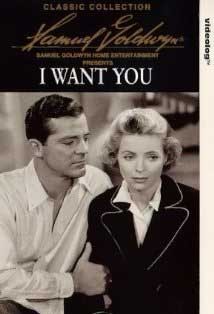
I WANT YOU
US, 1951, 101 minutes, Black and white.
Dorothy Mc Guire, Dana Andrews, Farley Granger, Peggy Dow, Robert Keith, Ray Collins, Mildred Dunnock, Martin Milner, Jim Backus.
Directed by Mark Robson.
I Want You is one of several melodramas of the late 40s, early 50s produced by Samuel Goldwyn. They had the element of soap opera. They were pieces of American melodrama based on stories by people like J.D. Salinger (My Foolish Heart) and Irwin Shaw as in this film.
Several were directed by Mark Robson (My Foolish Heart, Edge of Doom) and they had many of the same contract stars - Farley Granger, Dana Andrews.
Production values are high, the emotional impact is for the average American audience. In this case, the focus is on the Korean war and many reviewers consider it as softening the American public, especially the women, for the sacrifices involved in the call-up for this war. Memories of World War Two were still strong, the impact of Hiroshima also comes into consideration. The mentality of the Greer family in this film is that the dropping of the bomb is possible - Dorothy Mc Guire's strong speech highlights the issue in the language of the time; English neighbours are asked about bomb shelters; there are practices for the nuclear drop.
While the material is dated now, it is similar to many of the soap operas of any decade.
1. The 50s, a piece of Americana, domestic soap opera? in its period? Now?
2. Production values: black and white photography, the atmosphere of the American town? Music - using Leigh Harline's music and echoes of other Goldwyn soundtracks? The cast?
3. Elements of soap opera, family drama, emotional impact, American propaganda, the Korean war?
4. The United States at war: memories of World War Two, its effect on families, on the men? Commitment to the war in Korea? Patriotism? Call-up, decisions? The Truman and Eisenhower period? Hopes for the future? The judgment on the period in retrospect?
5. The title and its reference to military call-up? The emotional overtones of the title? The purpose of the film? Was it persuasive?
6. The early 50s and the war situation? The involvement in World War Two, war traditions? The background of World War One heroism? The cold war? Clashes with Russia? The nuclear era and the possibilities? Expectations? Pro- and anti-war, nuclear issues? The emotional impact of Nancy's speech at the meal-table? The nuclear threat?
7. The U.S. family - real/ideal? Home life, work, inheritance, lifestyle? The Greers and their tradition, involvement in the wars? The marriage of Sarah and Thomas Greer? The World War One memories? The sons and their involvement in the wars? The younger generation and the future?
8. Tom Greer and his style, bravado, work, talk, boasting, his sons and his pride, the attitudes of Martin and Jack? Sarah and her finally losing patience, her outburst against him? His humiliation? His telling Martin who knew already? Sarah and her dominance, not wanting Jack to go to the war, her reaction to Nancy's talk, not talking to her, the reconciliation?
9. Martin and his family, relationship with Jack, having to let him go to the war? The contrast with George Kress and his son, not being able to prevent him going to the war? Kress's reaction? Bond with Nancy? Tensions about Jack? The meeting with Harvey Landrum and the responsibilities? Reaction to the war? Nancy and her strength, her outburst, morale-boosting, stoic?
10. Jack and his youthfulness, work, place in the family, the call-up, having to go, resenting having to go, Carrie and his love for her, resentment about her father, blaming him for being called up? Wanting to elope? Friendship with George? Young man in the town? Comparisons with Martin? Future?
11. Carrie and her study, place in the town, love for Jack, the impositions of her father and mother, clash with them, reunion?
12. The judge and his role, snobbish attitudes, decisions about the call-up, challenge by Carrie? Friendship with Greers?
13. George Kress and his pleading for his son not to go? His drinking when his son is missing in action? The pathos of the parent who loses his son? George Jr and his friendship with Jack, the barracks sequences, missing in action?
14. A satisfying piece of Americana - in the context of the wars of the 50s?